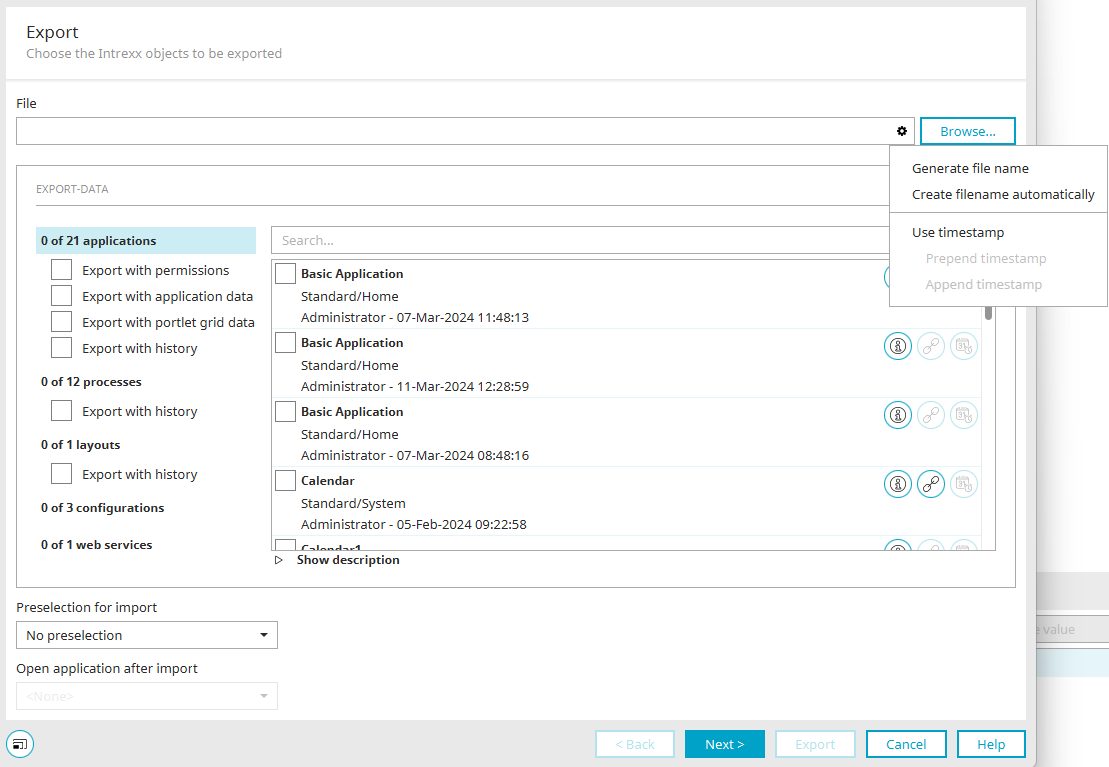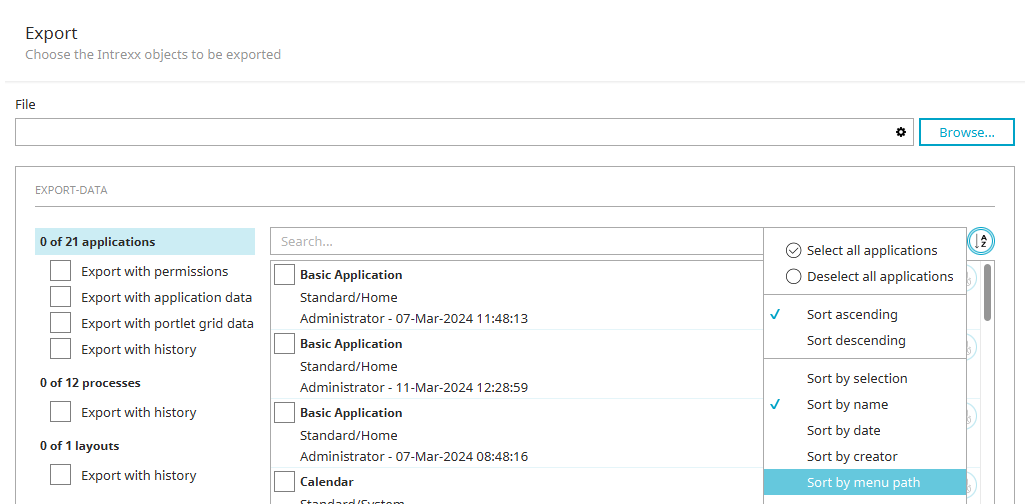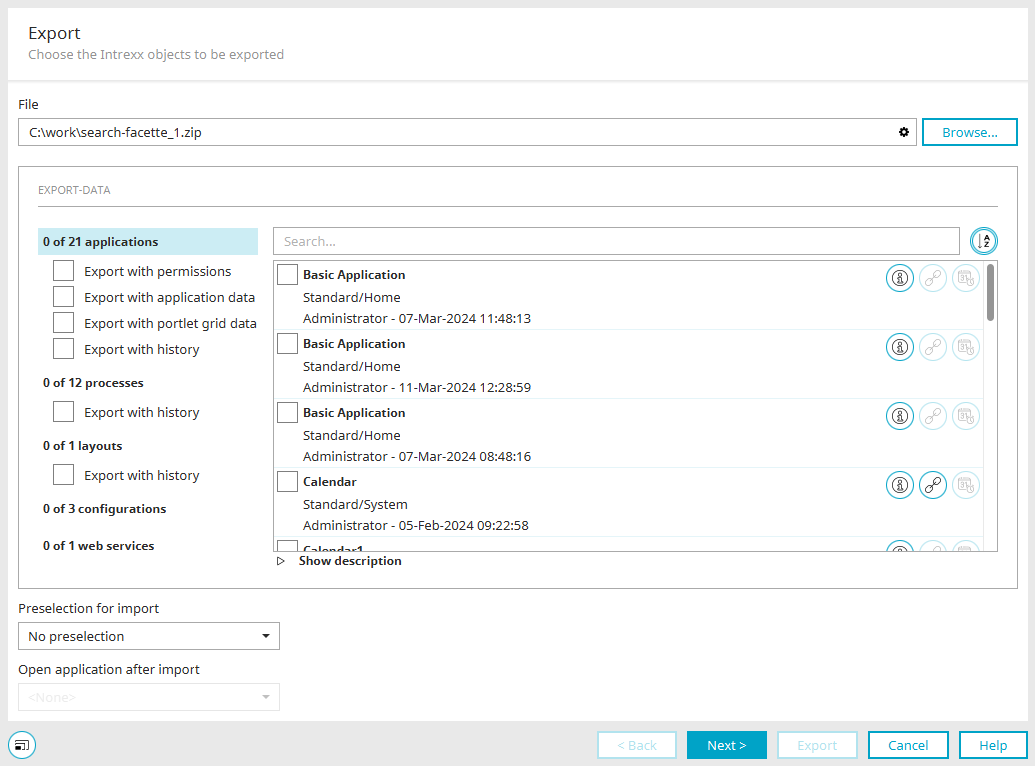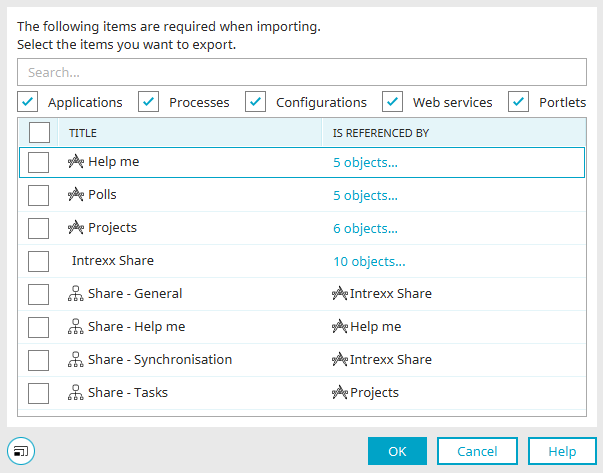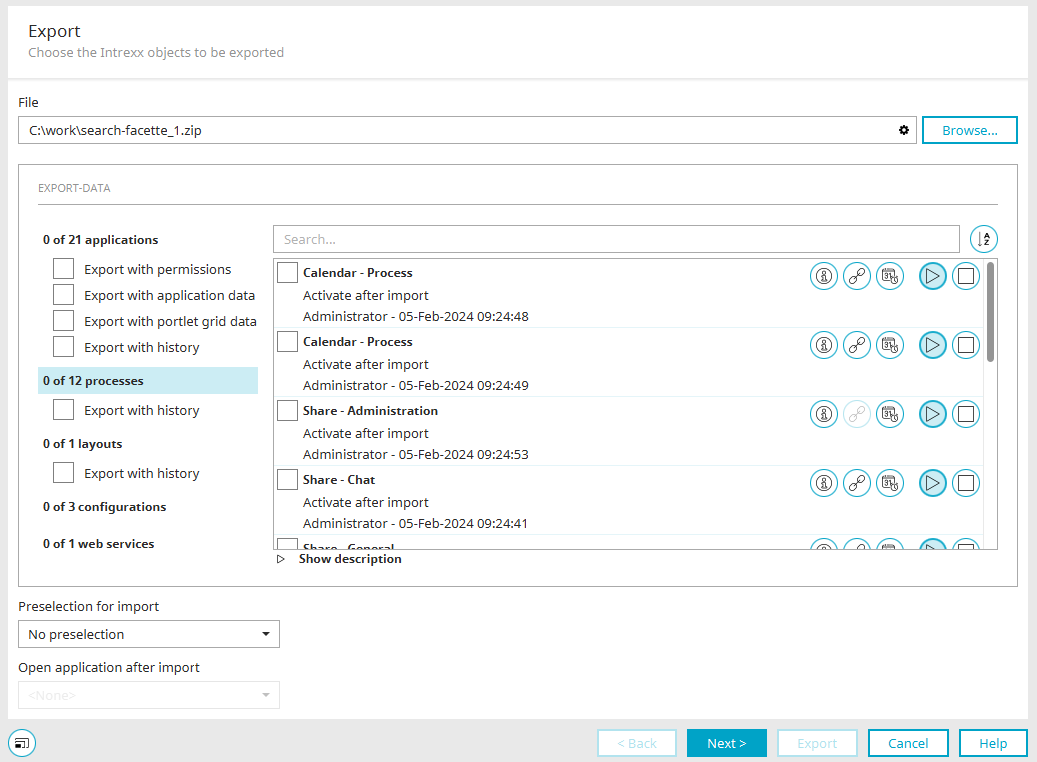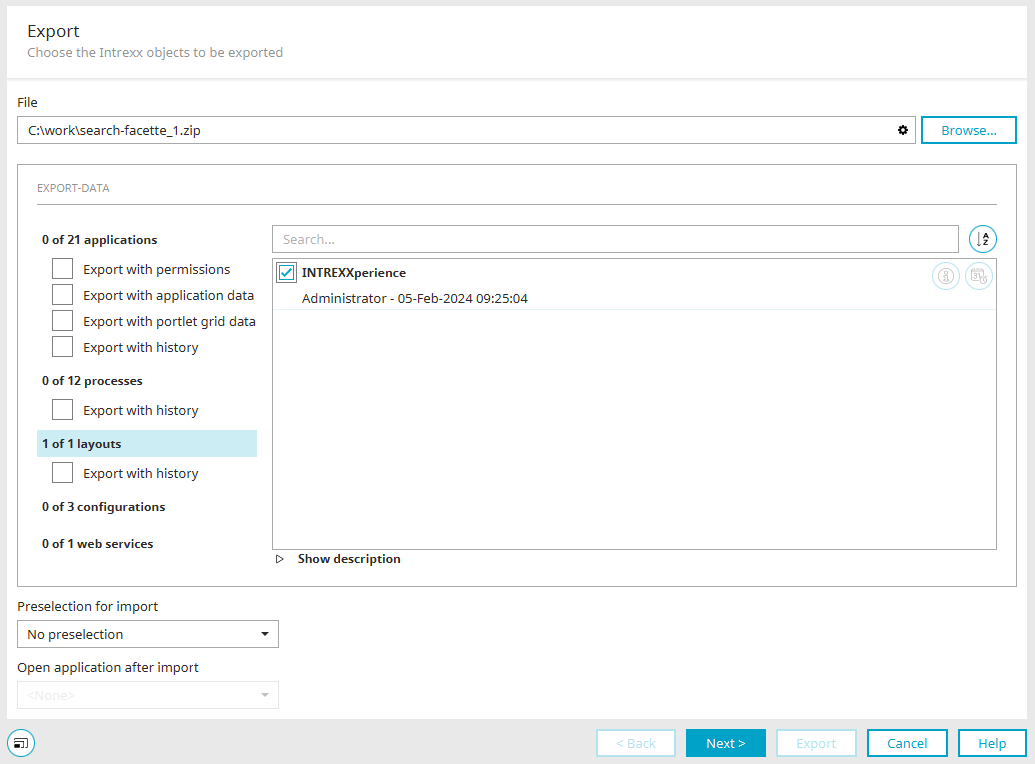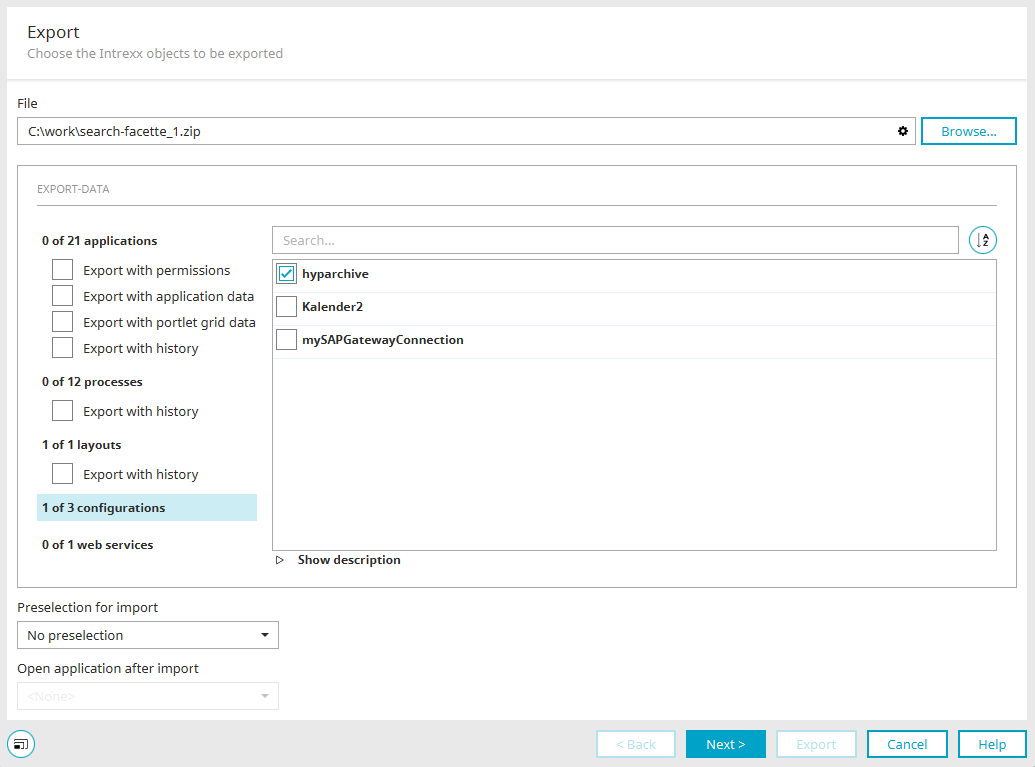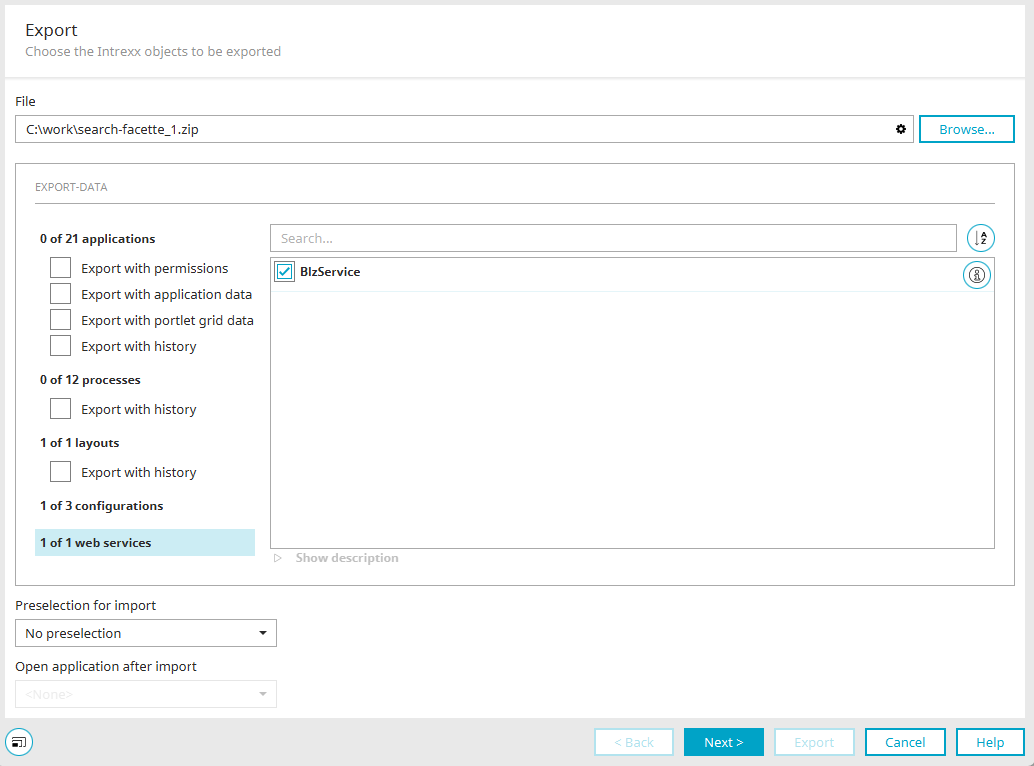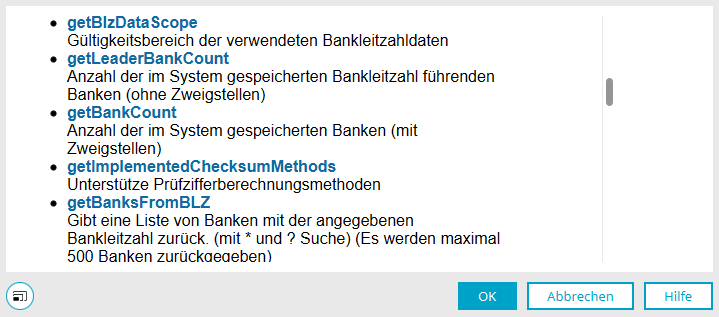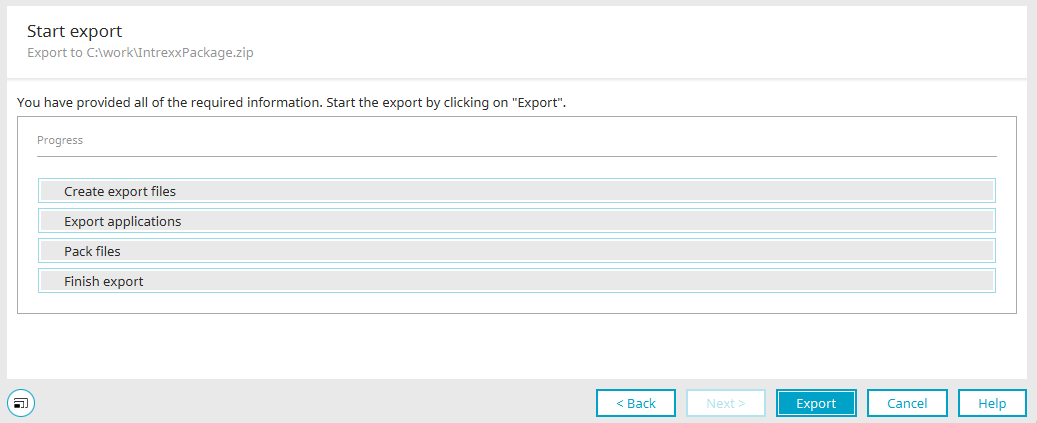Export applications, processes, layouts, configurations and web services
If you are in the "Applications", "Processes" or "Design" module, you can access the export dialog via the menu "File / Export [object]".
Select export objects
File
When exporting, the installation directory "/export" with the file name "IntrexxPackage.zip" is suggested here automatically. The path and filename can be changed.
![]() File name
File name
Click on the small gear icon to open a menu in which the following items can be selected:
Generate file name
Generates a file name based on the name of the selected objects if the menu is selected manually.
Create file name automatically
If this option is selected, the file name is automatically generated based on the selected objects.
Use timestamp
Uses a timestamp with the format "yyyyMMdd-HHmm" in the file name.
Prepend timestamp
If this option is active, the timestamp is placed before the actual name, separated by an underscore.
Append timestamp
The timestamp is appended to the file name, separated by an underscore.
Automatic generation is prevented if the file name has been customized by the user. Illegal characters and spaces are replaced by a minus "-" in the file name.
The selected options are saved in the "manager.properties" file and restored the next time the export dialog is opened.
Browse...
Opens the standard dialog where a directory for the export file can be selected.
Export data
You will find the following categories on the left of the dialog:
-
Applications
-
Processes
-
Layouts
-
Configurations
When you select a category, every exportable object of this type is listed on the right.
Search
A search term can be entered here. The list of export objects for the selected category is then filtered based on the entered term.
![]() Sorting
Sorting
Opens a menu that allows you to sort the export objects by different criteria. You also have the ability to select/de-select all objects at once.
Select the objects for the export
Select the checkbox to the left of an object if you want to export it. On the left-hand side, you will then see how many objects of that category have been selected for export. If you click on "Show description", a text area will appear at the bottom of the object list. A description can be entered for each object here (except for web services). The keyboard combination ALT + . enters the descriptions from the objects, which have selected for export in the current category, into the text area. The keyboard combination only works if the text area has been selected.
Applications
Export with permissions
With this setting, all permissions defined in the application properties will be included in the export.
Export with data
All data entered in the application is included in the export.
Export with portlet grid data
With this setting, the grids from all of the portlet containers in the application will be exported.
Export with history
All of the history entries from the selected applications are included in the export.
![]() Version information
Version information
Opens a dialog that displays information about the version number.
![]() Referenced elements
Referenced elements
Opens a dialog where objects that are connected to the export object can be included in the export as well.
![]() Version management
Version management
Opens a dialog where information about the entries in the history is displayed.
Referenced elements
Search
When exporting, you can search for linked objects here. Click on the corresponding checkbox to filter the list by applications, processes, configurations, web services or portlets.
Select category
If you do not want to see all of the categories in the list, simply deselect the corresponding checkbox - e.g. to only view applications.
First column
Select the corresponding checkbox here if a linked object is to be included.
"Title" column
Displays the title of the linked object.
"Is referenced by" column
Displays the object that references the current object.
The keyboard combination CTRL + SHIFT + A selects all of the entries in the list. The keyboard combination CTRL + SHIFT + D deselects all of the entries. All of the objects selected here will be added to the export on the export overview page when you click on "OK".
Status
The "Status" column can be found here during import, for which this dialog is also used to display referenced objects. The corresponding information is displayed in the "Status" column in a quicktip when the mouse touches the symbol.
Click "OK" to save the changes and close the dialog.
Preselection for import
You can define here whether the setting "Import with application data" or "Overwrite existing application" should be preselected when the application is imported later on.
Open application after import
Displays a selection list with all applications. The application selected there is opened directly in the "Applications" module for later import.
Processes
Export with history
All of the history entries from the selected processes are included in the export.
![]() Version information
Version information
Opens a dialog that displays information about the version number.
![]() Referenced elements
Referenced elements
Opens a dialog where objects that are connected to the export object can be included in the export as well.
![]() Version management
Version management
Opens a dialog where information about the entries in the history is displayed.
![]() Activate after import
Activate after import
If this setting is selected, the imported process will be activated and listed as activated on the overview page.
![]() Deactivate after import
Deactivate after import
If this setting is selected, the imported process will be deactivated and listed as deactivated on the overview page.
Preselection for import
You can define here whether the "Overwrite existing processes" setting should be preselected when the process is imported later on.
Layouts
Export with history
All of the history entries from the selected processes are included in the export.
![]() Version information
Version information
Opens a dialog that displays information about the version number.
![]() Version management
Version management
Opens a dialog where information about the entries in the history is displayed.
Preselection for import
You can define here whether the "Overwrite existing layouts" setting should be preselected when the layout is imported later on.
Configurations
If configurations from the "Integration" module are linked to objects from the "Applications" or "Processes" modules, these can also be selected for export here.
Preselection for import
You can define here whether the "Overwrite existing configurations" setting should be preselected when the configurations are imported later on.
Web services
Web services can also be exported in the "Integration" module via the main menu "Web service / Export web services". This menu is available if the "Web service" entry is selected in the "Consume data" branch.
![]() Version information
Version information
Opens a dialog where information about the version number is displayed.
Web service information
All available operations are listed here and explained with a brief description.
Click "OK" to close the dialog again.
Preselection for import
You can define here whether the "Overwrite existing web services" setting should be preselected when the web services are imported later on.
Start export
All information on this dialog can be found here.
